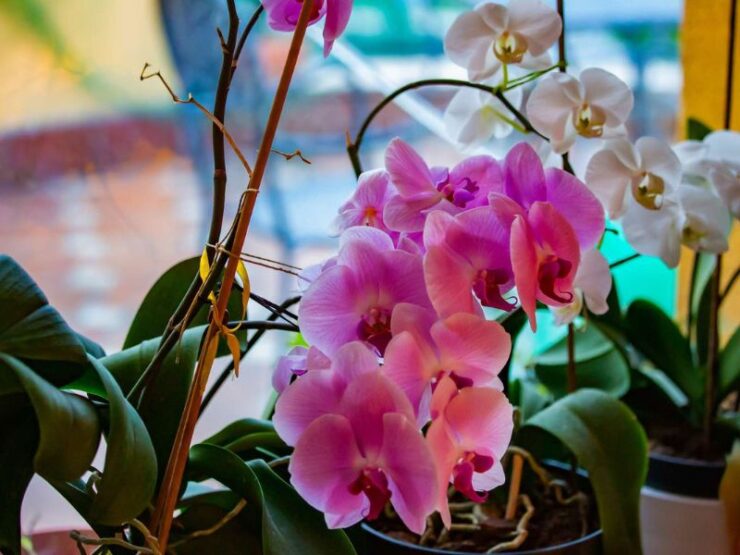Orchids are some of the most captivating and exotic plants, admired for their vibrant colors, intricate patterns, and delicate forms. They are a favorite among gardeners, florists, and plant enthusiasts alike. But one question that often arises among orchid lovers is, “How long do orchids live?” Understanding their lifespan requires a deeper dive into their natural growth patterns, proper care, and the conditions that influence their longevity.
In this comprehensive article, we’ll explore the lifespan of orchids, factors affecting their longevity, tips for keeping them healthy, and how you can ensure these stunning plants thrive for years.
Lifespan of Orchids in the Wild
Orchids are one of the largest families of flowering plants, with over 25,000 species worldwide. In their natural habitats, which range from tropical rainforests to arid deserts, orchids can live for decades. Their long lifespan is largely attributed to their ability to adapt to diverse environments.
In the wild, orchids grow symbiotically with fungi that provide essential nutrients. This relationship helps them thrive and survive challenging conditions, often enabling them to outlive many other plant species. Some orchids have been known to live up to 50-100 years when left undisturbed in their natural ecosystems.
Lifespan of Orchids in Cultivation
Orchids grown as houseplants or in gardens have slightly different lifespans compared to their wild counterparts. With proper care, most cultivated orchids can live for 10-15 years or longer. However, the longevity of an orchid in cultivation depends heavily on the following factors:
- Species or Hybrid Type: Some species are naturally more robust and longer-lived than others. For instance, Phalaenopsis orchids (moth orchids), among the most popular houseplants, can live for decades with proper care.
- Care and Maintenance: Providing the right light, water, humidity, and fertilization can significantly extend the lifespan of orchids.
- Environment: Orchids thrive in specific temperature ranges and humidity levels. A stable environment can help them live longer.
Factors Affecting Orchid Lifespan
To understand how long orchids can live, it’s essential to consider the factors that influence their longevity:
a. Species and Genetic Makeup
Some orchid species, such as Dendrobium and Cymbidium, are naturally hardier and can live for several decades. Hybrid orchids, which are bred for their beauty and resilience, may have shorter lifespans depending on their genetic makeup.
b. Proper Care
The most critical factor in determining an orchid’s lifespan is how well it is cared for. Neglect or improper care can significantly shorten its life. Key aspects of care include:
- Watering: Overwatering can lead to root rot, while underwatering can cause dehydration. Striking the right balance is crucial.
- Light: Orchids require indirect light. Too much direct sunlight can scorch their leaves, while insufficient light can hinder growth.
- Fertilization: Orchids benefit from regular feeding with a balanced fertilizer, especially during their growing season.
c. Pests and Diseases
Orchids are vulnerable to pests like spider mites, scale, and aphids, as well as fungal and bacterial infections. Keeping a watchful eye and addressing issues promptly can prevent these problems from shortening their lifespan.
d. Repotting
Over time, orchids outgrow their pots, and their growing medium breaks down. Repotting every 1-2 years ensures healthy roots and prevents the plant from becoming root-bound or stressed.
How to Extend the Life of Orchids
Orchid care requires patience, consistency, and attention to detail. Here are some tips to ensure your orchids live as long as possible:
a. Provide Optimal Lighting
Place your orchids in a spot where they receive bright, indirect sunlight. South-facing windows are ideal, but you can use sheer curtains to diffuse the light.
b. Maintain Proper Watering Routine
Water your orchids once a week or when the potting medium feels dry. Always use room-temperature water and avoid letting the roots sit in water to prevent rot.
c. Control Humidity Levels
Orchids thrive in environments with 50-70% humidity. Use a humidifier, mist the plant occasionally, or place a tray of water with pebbles near the orchid to increase humidity.
d. Fertilize Regularly
Feed your orchids with a balanced orchid fertilizer every two weeks during the growing season (spring and summer). Reduce feeding during the dormant period (fall and winter).
e. Monitor for Pests and Diseases
Inspect your orchids regularly for signs of pests or diseases. If you notice yellowing leaves, wilting flowers, or sticky residue, act quickly to treat the issue.
f. Repot When Necessary
Repotting gives your orchid fresh medium and room to grow. Use a specialized orchid potting mix that allows for proper aeration and drainage.
Signs of a Healthy and Long-Lived Orchid
To ensure your orchid is thriving, look for the following signs:
- Firm, green roots: Healthy roots are a sign of a well-maintained plant.
- Vibrant leaves: Leaves should be green and free from spots or discoloration.
- Consistent blooms: Orchids that flower regularly are generally healthy and well cared for.
Reviving an Orchid for a Longer Lifespan
Even if your orchid appears to be struggling, it’s possible to revive it with some effort:
- Trim away dead or damaged roots.
- Repot the plant in fresh medium.
- Provide consistent care, including proper watering and lighting.
With time and dedication, many orchids can recover and continue to thrive for years.
Orchid Longevity: A Testament to Nature’s Resilience
The lifespan of orchids is a testament to their resilience and adaptability. With proper care and attention, these stunning plants can become long-term companions, gracing your home or garden with their beauty for decades.
Whether you’re a seasoned orchid grower or a beginner, understanding their needs and providing the right conditions is the key to enjoying their elegance for years. By following the tips outlined in this article, you can ensure your orchids not only survive but thrive, adding a touch of natural splendor to your life.











Add comment